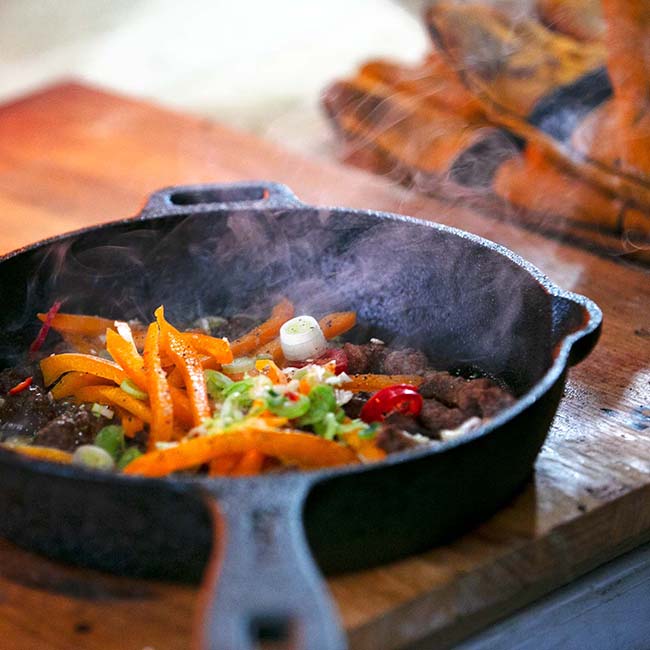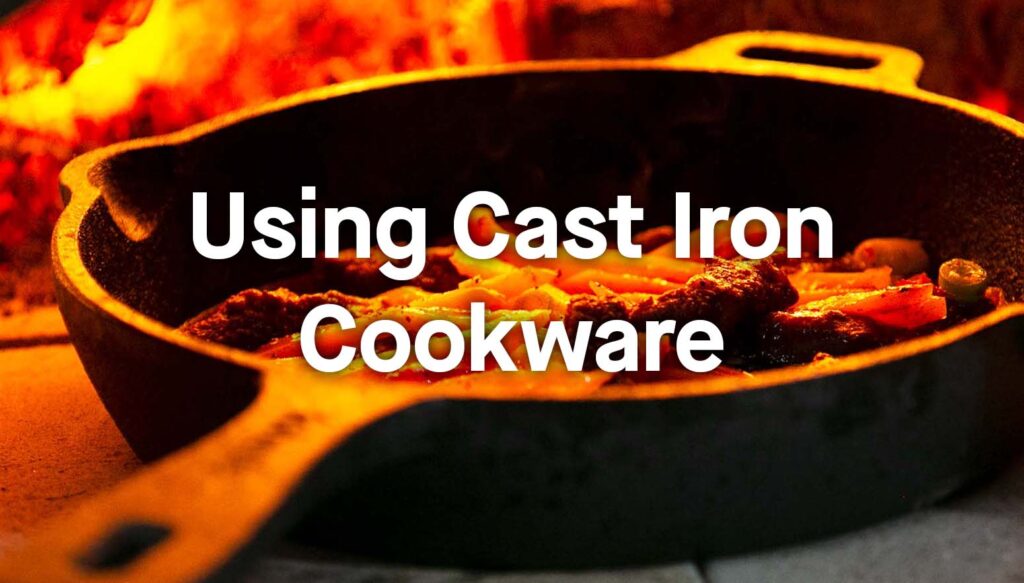Accessories, All Blogs, Pizza Ovens
How to Use Cast Iron Pans in Your Pizza Oven
Yes, it’s called a pizza oven, but does that mean its limitations stop at handcrafted dough and fresh toppings! When it comes to exploring the truly endless possibilities of your pizza oven, cast iron should be your best friend. Sometimes, as we approach the colder months here in England, pizza isn’t the first thing on the menu. We often find ourselves wanting something a little more comforting and warming. Such as a casserole or stew, steak and chips, or even a homemade curry!
In this blog we’ll explain why cast iron pizza oven pans are the perfect cooking vessel for your winter warming dishes. As well as giving our top tips for prepping and cooking with cast iron. Let’s dive in!

Why Cast Iron is Perfect for Pizza Ovens
Igneus cast iron retains and distributes its heat effectively, and it can stand up to the intense heat of a pizza oven, whether that be a wood fired pizza oven, or a gas fired pizza oven. This ensures there’s absolutely no ‘hot spot’s which result in uneven cooking or browning. Cast iron is also super durable. It’s built to last. So, if you happen to have a ‘hand-me-down’ set of cast iron pans, use them! They’ll be just as good or even better than a brand-new set. That’s because they become more seasoned the more they’re used, meaning they develop a natural non-stick surface.
Finally, the versatility of cast iron is why they’re the true winner for use in pizza ovens. Whether you’re searing a steak, slow cooking a casserole, roasting a joint of meat or even baking bread, cast iron is the perfect material to use.

Tips for Prepping Your Cast Iron Pan
When you buy a new set of cast iron pans, it’s important to season them properly prior to using them for the first time. What seasoning essentially entails is curing a thin layer of oil onto the surface of the pan, ensuring your food doesn’t stick, and helping to prevent rust from forming. As the oil heats up, it bonds to the surface of the metal, a process called polymerisation. Here’s how to do it:
- Wash and dry your pan
- Rub it all over with oil and buff it out with kitchen roll or a t-towel (use unsaturated fats like vegetable oil)
- Place your pan into a preheated pizza oven and leave for 30 minutes. The temperature of your oven should be around 250°C.
- Take out of the oven and leave to cool
- Repeat step 2 and 3, a few more times. We recommend 3-4 times.
Your cast iron pans are now ready to use!

What Can You Cook in Cast Iron Pans in a Pizza Oven?
We’ve already mentioned a few great options, and it’s true that the possibilities are endless, despite how cliché that sounds! From searing steaks and roasting vegetables to baking bread and frying eggs, cast iron’s excellent heat retention and even cooking make it a versatile tool for a variety of dishes. The high temperatures in a pizza oven allow you to achieve perfect caramelisation, crisp textures, and rich, deep flavours, and the cast iron’s durability means you don’t have to worry about damaging your cookware.
When searing or frying food using cast iron, it’s important to heat the pan before adding the food. That’s because it takes a while for the heat to permeate through the pan, and wouldn’t allow your food to develop a rich, caramelised crustation. When cooking stews and casseroles, you don’t need to worry about this, just add your ingredients to the casserole dish and place in a preheated oven. The long slow cooking will work its magic.

Maintaining and Caring for Cast Iron Pans After Use
In order to maintain the non-stick surface of your cast iron cookware, it’s important to season the pans after each use. Or at least every 2-3 uses. Once you’ve washed the pans after use, simply put them through one oil and heat cycle. This will ensure the pans constantly have a layer of curation and help to prevent them from rusting over time.
When cleaning cast iron, don’t use any harsh chemicals. Instead, use warm water with a little dish soap. Rather than using an abrasive brush, use a soft sponge. This will prevent the pans from losing their seasoning. Once you’ve washed your pans, always dry them using a t-towel straight away. Never leave them to dry naturally as this again can encourage them to rust.
When storing your cast iron cookware, choose a cool, dry place such as a cupboard inside your house. Try not to store them in an outdoor shed, as over winter when the weather is colder the moisture build up can lead to the pans rusting. If you stack your pans, it’s a good idea to put a cloth between them to prevent scratching the seasoned layer.
Final Thoughts
So, there we have it. All you need to know, and probably more, about cast iron pizza oven pans! If you’re not yet the proud owner of your own set of cast iron pans, and want to be, check our range of cookware here. Of course, as always, if you’d like any advice from our expert team, they’re on hand to help every step of the way. You can get in touch on 01423 608648 or email in a question on sales@thepizzaovenshop.com.


